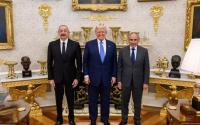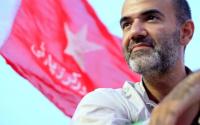 Women show their inked fingers after voting in the Palestinian elections at a UN school which is being used as a polling station in Gaza City. Photograph: Abid Katib/Getty Images
Women show their inked fingers after voting in the Palestinian elections at a UN school which is being used as a polling station in Gaza City. Photograph: Abid Katib/Getty Images
Opinion polls predict that voters will use the first Palestinian national election in which there is a genuine race for power to punish Fatah, the movement founded by Yasser Arafat, for years of corruption and poor administration. Fatah is likely to lose its outright majority in parliament as Hamas emerges as a potential partner in a power-sharing government.
But Israel and its western allies have warned that the rise of Hamas, which is on the ballot as the Change and Reform movement because it remains a banned terrorist organisation in Israel, could be a further obstacle to a peaceful settlement of the Palestinian conflict unless the group renounces violence.
Armed groups agreed yesterday not to carry weapons on election day in an effort to prevent an escalation of factional and clan violence that has claimed scores of lives over recent months, particularly in Gaza. But hours later, a Fatah leader in Nablus was shot dead by gunmen from a rival faction of the party as he tried to prevent them tearing down election posters.
About 1.3 million registered voters for the first parliamentary election in 10 years will choose from among 728 candidates contesting 132 seats. Half are directly elected by constituency and the remainder by proportional representation.
Khalil Shikaki, director of a Palestinian policy centre, said that Hamas's rise in support had less to do with its extremist views than distaste for Fatah. "In exit polls I held last year in the presidential elections and in the local elections, over 95% of the voters said that corruption was the most important factor in their voting. An overwhelming majority said that the PA and Fatah are corrupt," he said.
Ziad Abu Amr, a former Palestinian cabinet minister who is running for re-election as an independent, said that Hamas was being forced to deliberate on whether to join a power-sharing government if Fatah did fail to win an outright majority, and how to use its power.
"Hamas is going to adjust from a resistance movement to a political party in the system. The question is how they deal with the complex issues such as the peace process, internal order, political participation in parliament," said Mr Abu Amr, who was the primary negotiator between Hamas and the Palestinian president, Mahmoud Abbas. "It's convenient to be in opposition and want Fatah to make mistakes and translate those mistakes into support for Hamas without any effort. But Hamas supporters will expect it to use its power to do the things it said it will."
Hamas's popularity presents a dilemma for Israel and western leaders. Israel says that it will not deal with the group until it renounces violence and expunges its charter of a call for the destruction of the Jewish state. The US has said it will not deal directly with Hamas until it disarms, while Tony Blair said on Monday: "It is very difficult for us to be in the position of negotiating or talking to Hamas unless there's a very clear renunciation of terrorism."
But western diplomats believe that the governments cannot entirely bypass Hamas and that they will find ways to deal with the group through other members of the Palestinian Authority.
Fatah says that by competing in the elections, Hamas is implicitly recognising the Oslo accords, which commit the Palestinians to a state alongside Israel. Hamas itself is backing away from a refusal to negotiate with Israel. "If Israel has anything to offer on the issues of halting attacks, withdrawal, releasing prisoners ... then a thousand means can be found," said a Hamas leader in Gaza, Mahmoud al-Zahar.
Yesterday, Israel's acting prime minister, Ehud Olmert, said Israel was open to a negotiated settlement, but only after an end to violence. "If the Arabs manage to turn their backs on terrorism and drop their desire to annihilate Israel, then they will be able to establish a Palestinian state within temporary borders until all of the complex issues involved with a permanent settlement are solved," he said.
http://www.guardian.co.uk/frontpage/story/0,,1694210,00.html






